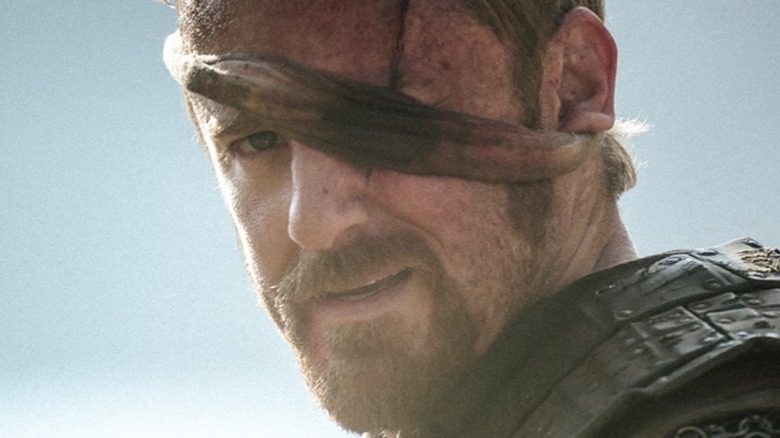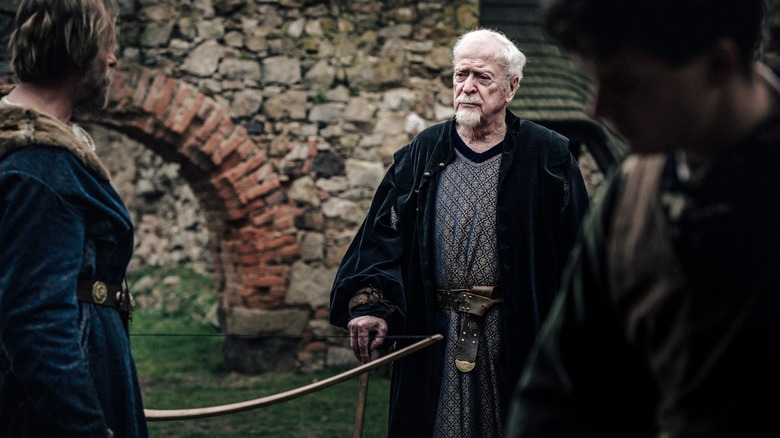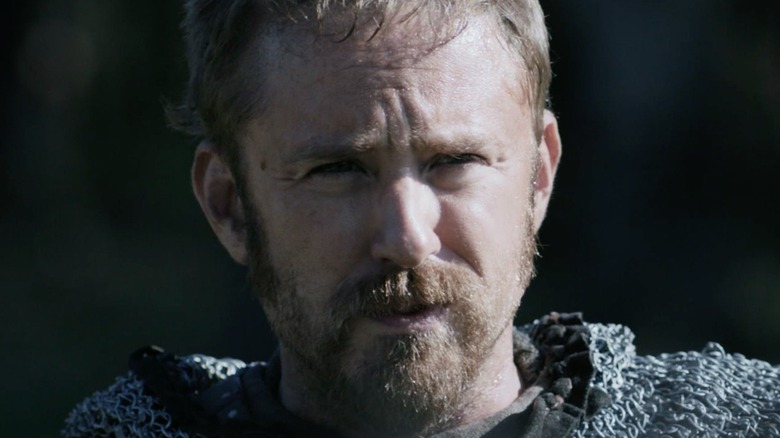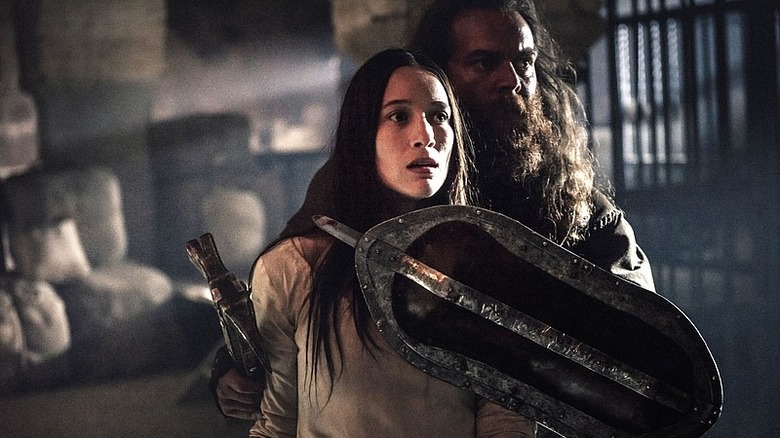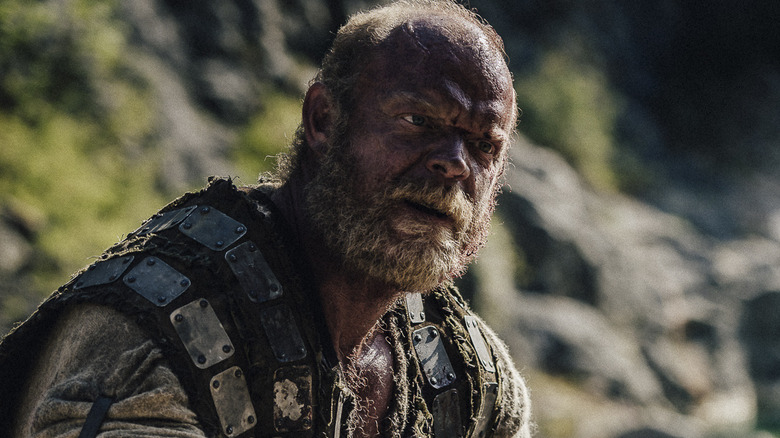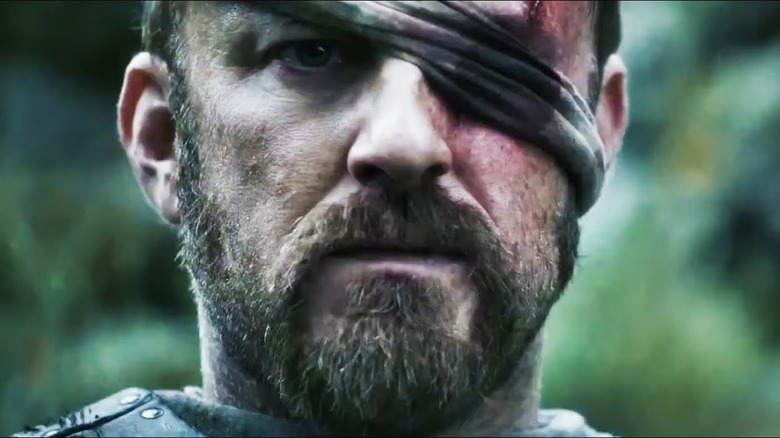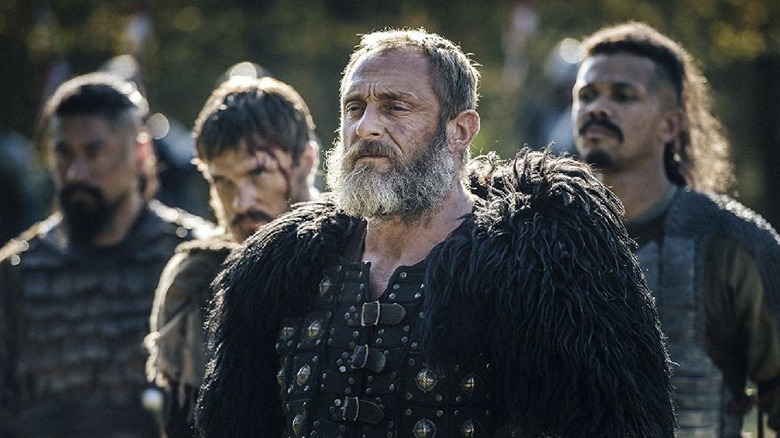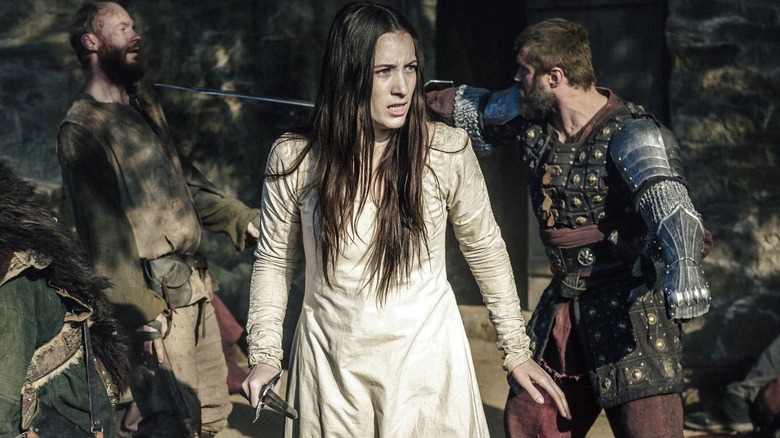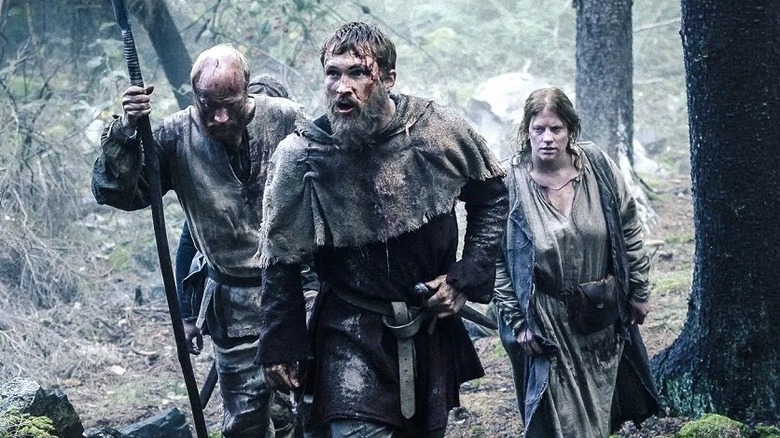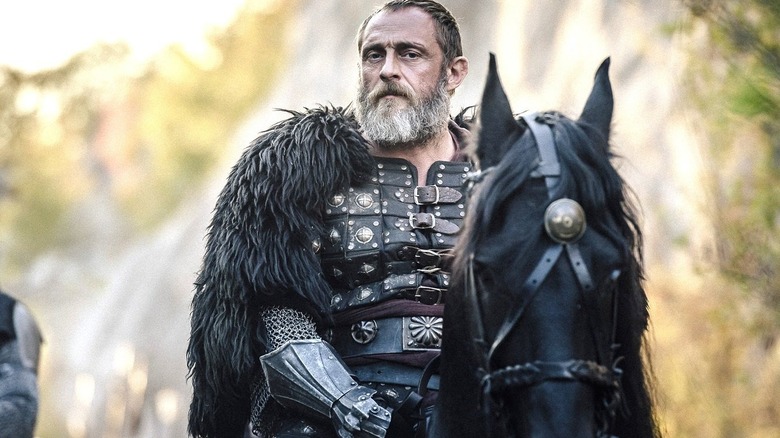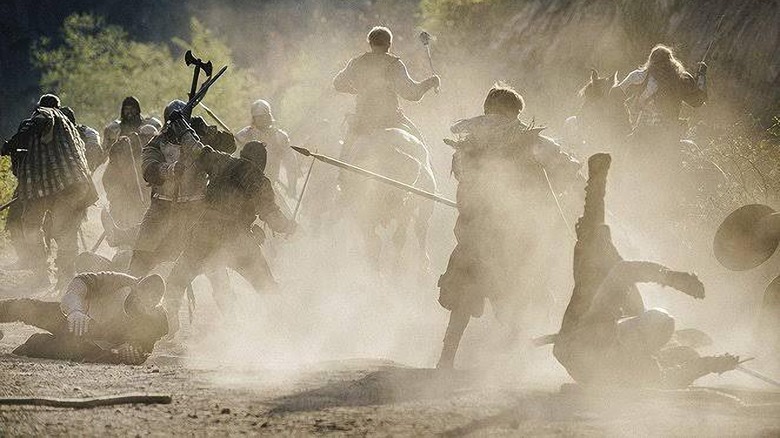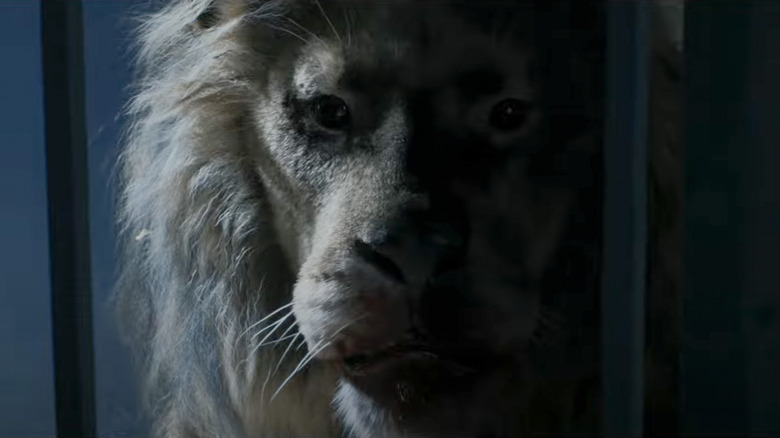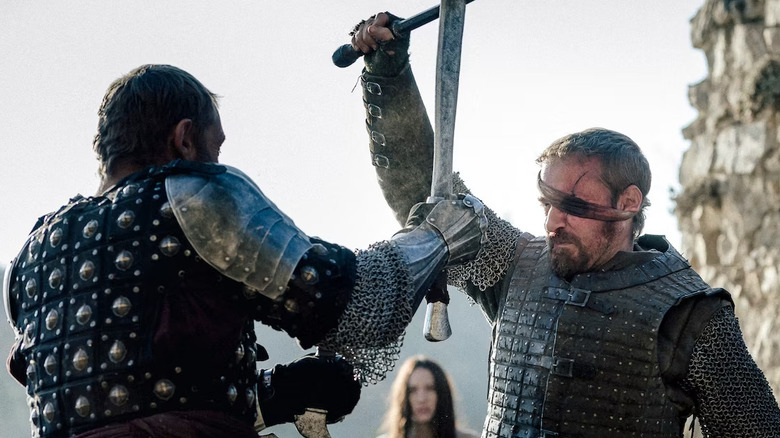Medieval's 12 Most Epic Moments Ranked
If you're looking for a movie that features an abundance of epic action and memorable moments, "Medieval" should be next on your list. More than any other ingredient, "Medieval" is packed from greaves to gorgets with brutal battles and mythic feats of badassery. The movie tells the story of Jan Zizka, the 15th-century Czech warrior who went from poor sell-sword to military legend, and as you'd expect, showcases a (literal) king's bounty of Medieval swordplay and strategy. From the smallest pieces (like the swings of his trademark mace) to the biggest brushstrokes (like his innovations that changed the face of war forever), the movie takes every opportunity to remind you that Zizka was an epic guy — and Zizka actor Ben Foster is, as well.
It remains to be seen where "Medieval" will land in the ever-expanding lineup of medieval movies, but at least in one metric — exciting, innovative fight scenes — would seem to put it near the top. Among all that action, picking out the best bits is tough, but below is a stab — compared to the few thousand stabs in the movie — at ranking the 12 most epic moments in "Medieval."
The carriage rescue
The film begins with a lengthy action sequence making one thing immediately clear to the audience: This movie doesn't pull any punches.
After an introduction to Jan Zizka (Foster) and his band of mercenaries (given just the barest clues to their piety and fearlessness), the squad is off, blitzing a much larger and better-armed host of knights. Their goal is to prevent the knights from seizing a certain carriage and killing the noble inside — Lord Boresh, played by Michael Caine. Outnumbered and outgunned (or more accurately out-crossbowed), Zizka and his mercs resort to a combination of clever guerrilla strategy and seemingly impossible feats of fortitude, the combination of which come together in a truly epic opening to "Medieval."
The majority of medieval combat, at least in movies, comes in the form of large-scale confrontations between armies of heavily-armored knights, typically standing in neat rows. "Medieval" is quick to explain that Zizka's genius comes from breaking those rules, as he rescues Boresh with a quiet, precise ambush from seemingly nowhere. Here was someone employing guerilla warfare long before the term was coined.
Zizka's small squadron executes the enemy platoon through a lightning-fast series of crossbow sniper shots and one-and-done blows by mace. Even the enemy horses aren't spared, as Zizka's burlier companions shoulder-tackle the beasts straight into a nearby river — though the animals can swim, their armored riders cannot.
Ben Foster's calm
As surprising and seemingly counterintuitive as it may be, one of the epic aspects of "Medieval" is also one of its most quiet, subtle, and easily overlooked: How eerily calm Foster, and therefore Zizka, confronts the realities of his surroundings.
He begins the movie as a common sword for hire, a mercenary who may have a conscience and a love for god, but puts coin and blood above all. That's what makes his silent stoicism so unnerving; when the melees end, Zizka collects himself and acts as if nothing had happened. Practically every other fighter in the movie can be seen screaming from bloodlust or wailing from their grievous wounds, but not Zizka. With the exception of the film's conclusion he is unshakably silent, still, and studious, like a "beige praying mantis."
There's something equal parts badass and unsettling about Foster's portrayal of Zizka, especially when it's contrasted with his antagonists — he's a warrior with an unassailable calm and they are career politicians and royals with vicious tempers. Not only does this difference in character make Zizka stand out as an impressive and admirable soul, but it also makes his swift, brutal kills so exceptionally epic.
Out with the corpses
The way "Medieval" gets out of the first act and into the meat of its story is by forcing the otherwise coin-driven mercs into a job that means more than money: Kidnapping the noblewoman Katherine, fiancée of the powerful Lord Rosenberg and niece to the king of France.
This mission bends Zizka's neutrality; at first, he's morally opposed to kidnapping a woman, and by the movie's midway point, he's morally opposed to returning her to the political chess board in which she's only a pawn to be sacrificed. But before Katherine's will and the plight of his country can sway him either way, Zizka and his men have to nab Katherine and escape alive, and they handle the task creatively, to say the least.
Disguised as monks, the crew infiltrates a cathedral in which Katherine is attending a sermon. Pretending to be harmless men of the cloth, they lure Katherine away from the worshiping throng and into an isolated back room. A few precise crossbow shots and backstabs later, her guards are dispatched and she is collected. Then the larger problem presents itself: How to sneak her out of the cathedral and the city, with all remaining guards now aware of her absence. For that, Zizka and Katherine lay together at the bottom of a wagon, safely hidden by a dozen or so diseased, bloody corpses that cover them completely.
Cyril and Lars
The half-dozen men who serve alongside Zizka are all master combatants, most with their own unique fighting styles and weapons expertise. In the case of Cyril (Guy Roberts) and Lars (former "World's Strongest Man" winner Magnus Samuelsson), however, the master combatant title applies — but the two approach battles like they were twins.
Both men are massive, muscled, bald, and bearded, and in the same way that they both look like bears, they both fight like bears, too. The two are the "Medieval" versions of the Hound and the Mountain from "Game of Thrones," barreling through their enemies with few words but plenty of force.
From the first action sequence, the pair of towering troopers deliver ferocity, shoulder-tackling enemy horses — complete with armored riders — off the road and into a river. The pair never lets up, barreling through enemies with Hulk-like strength and even going so far as to rip enemy limbs off (in one case, biting off a nose and spitting it back at its former owner). Even when the pair, along with the rest of the mercenaries, eventually turn their backs on Zizka and steal Katherine for their own, they can't help but dominate fight scenes by skewering enemies with spears or throwing them around like rag-dolls.
Maggot medicine
In any movie — particularly one about a master warrior and strategist — you'd be safe in assuming that many of its epic moments would come on the battle field. While that is true for many "Medieval" moments, one of the film's best is about the opposite of combat: healthcare. Specifically, when Katherine uses live maggots to clean out Zizka's injured eye.
After receiving a nasty slash from his cheek up to his forehead, Zizka is left bloody, weakened, and with only one working eye. After he falls unconscious, Katherine spies a group of maggots eating a nearby rat corpse. In a genius move, she washes the insects off and inserts them into Zizka's open eye wound, knowing that they will eat the necrotic flesh inside and keep the wound from worsening.
The camera stays on the wound throughout, not sparing viewers even a bit of the gruesome act — nor does it spare them when days later, Zizka removes his bandage and lets the now-dead maggots fall out of his open gash.
The headless merc
The exclusive Red Band trailer for "Medieval" concludes with one of the movie's most visceral, gory moments: Zizka killing a major Cuman mercenary and then proceeding to saw his head off as casually as if it were a tree for firewood. While that is intense enough, particularly in contrast to Katherine's horrified gape and Zizka's stony stare, what happens to the head is even wilder.
With Torak (Roland Moller) and his men scouring the Czech countryside, brutally and mercilessly murdering their way through town after town, Zizka is pushed to his limit. The otherwise honor-bound warrior decides to send Torak a message written in blood. After killing the Cuman soldier, Zizka saws off his head, builds a human effigy out of pine branches, and places the dismembered head atop it.
The message is loud and clear: Torak is no longer dealing with the old Zizka. This is a new Zizka, one who has shed the cumbersome virtues of tact and morality and replaced them with rage and bloodlust. This marks a significant tonal shift in the movie, as from this point on, the typically quiet Zizka begins yelling frequently, his litheness replaced with raw, bullish strength.
My will
Undoubtedly, one of the most admirable and ultimately heroic characters in "Medieval" is Lady Katherine (Sophie Lowe), who endures an almost inhuman amount of abuse, only to emerge on the other side as a national hero. There is one moment near the end of the movie where she first uses the phrase "my will," in which she makes this transformation official, and it is one of the movie's most epic moments.
For over an hour, Katherine is pushed around by the various powers that be: mercenaries, knights, kings, and God. Like other major characters, she spends much of the movie contemplating the relationship between "God's will" and "the king's will," and her relationship to both. She finds herself imprisoned by either or both forces, but in one bold moment, she declares that the only force in her life from here on out is "my will."
With Zizka's help, she sets out on the first active quest in her life that comes from her agenda alone. The moment of her evolution is handled well for a movie that is supposedly just a popcorn action flick, and her utterance of those two words is chilling.
Saved from hanging
Shortly after Katherine finds her inner warrior and begins acting of her own accord, she and Zizka set out together to free both her and her country from Torak's brutal campaign and the impending coup d'état by would-be king Wenceslaus.
In a move that surprises Zizka, Katherine amends her vow to free herself from God's will and the king's will by breaking away from Zizka's will, as well. The amendment occurs when the pair spots a young peasant boy about to be hanged by Torak's men, and against Zizka's wishes, Katherine abandons their greater plan in order to sacrifice herself and save the boy. Free from being a pawn in anyone's game, Katherine becomes the hero and inspires Zizka to do the same. The ensuing fight to save the boy is swift, messy and savage.
This is the first fight important enough — and desperate enough — to force Katherine to resort to violence, and the moment is effective. She dispatches an armored soldier with a rage-fueled stab, and Zizka responds by upping his level of violence in proportion. Despite now only having one eye and a small fraction of his combat gear, Zizka wades into the soldiers with a heretofore unseen amount of ferocity.
The wagon fort
Easily one of the movie's most epic moments is Zizka's use of an adaptable, mobile battle wagon, and the good news for fans of the movie and its history alike is that the innovative vehicle is one hundred percent real.
Known as a Hussite war wagon, the real-life Zizka and his troops used them during the Hussite/Bohemian Wars. Not only did Zizka and the Hussite rebels he commanded employ these wagons, but they were the inventors as well — aside from a variant independently created in ancient China, the Hussite war wagon was the first of its kind, and the first ever in Europe.
The effectiveness of the war wagon comes from its deceitfully simple exterior — what looks like a normal covered wagon used for simple troop transport unfolds into much more. Wooden walls unfurl from the interior, creating a wall for archers, complete with arrow-slits. A companion wall unfolds downward, allowing Zizka's guerrilla fighters to hide beneath the wagon and stab up at enemies with pole-arms. Perhaps most devastating of all, the wagon allows Zizka's men an ample storage space to store smoke bombs, bundles of flaming pitch, and other instruments of brutality.
Smoke and stone
Proving himself to be more than a one-hit-wonder when it comes to innovative military strategy, Zizka bolsters his use of the war wagon with a series of other innovative tactics, each as clever and surprising as the next.
While his enemies stick to orderly rows of knights, neatly divided into classes by their preferred weapons, Zizka's forces become one with their environment — hiding in scrubs and on hilltops, they use controlled smoke bombs, walls of fire, and even guided avalanches to render the otherwise superior enemy force inferior.
The tactics are largely symbolic; the Hussite rebels, who tend to the vast majority of the countryside, use its natural features to expel invading mercenaries and the king's hired thugs. Knowing the terrain better than their enemies — nearly all of them either foreign or too wealthy to live outside of the major cities — the Hussite rebels strategically weaken cliff-faces in advance in order to unleash devastating avalanches on their enemies, while those same enemies choke from thick smoke and burn from flaming oil.
Releasing a lion
Some moments just speak for themselves. When Zizka releases a bloodthirsty lion on his enemies, things get memorably intense.
While trying to flee the hunting castle of King Wenceslas, Zizka and Katherine are pursued by an overwhelming enemy force, most of them Cuman mercenaries. After Zizka bottlenecks them by running through a narrow hallway, his wisdom is rewarded with a heaping helping of luck when he comes across the lion's cage. Then wisdom and luck meet faith, as Zizka decides to release the growling, pacing, blood-covered lion from its cage, not knowing whether it would turn right and attack the Cumans or left and maul him.
There is a lot of irony in the moment. Zizka, who spends the entire movie acting against the so-called will of God (and God's chosen messenger, the king), unleashes the lion based solely on faith. As brilliant a strategist as he is, Zizka has no reason to assume the lion will choose one side as prey over the other. That faith is the crux of this decision to leave his fate up to chance — and the whims of a hungry predator.
Cliff diving
For both main characters in "Medieval," their struggle is not only about swords and shields, but their souls.
Zizka and Katherine both have to fight the forces of King Sigismund (Matthew Goode) in order to survive, but to truly live, they also have to battle the overwhelming sense that fate, and perhaps even God, is dead set against them. In two separate moments, Katherine and Zizka conclude these fights with literal leaps of faith, from the top of the hunting castle walls. In both instances, the two plunge what seems to be hundreds of feet, hoping to land in the surrounding lake.
For Katherine, the jump is an act of will, the final rebuke of the king's will, and even God's. She has every intention of dying in the fall and in doing so, removing herself from the chessboard permanently. For Zizka, the dive is to ensure that Torak is good and truly dead, and he similarly has no care for his own safety. Though Katherine doesn't survive her fall, the two swan dives together transform Zizka into his destined role: A righteous, furious leader of the Hussite rebels, finally imbued with a real reason to fight.
